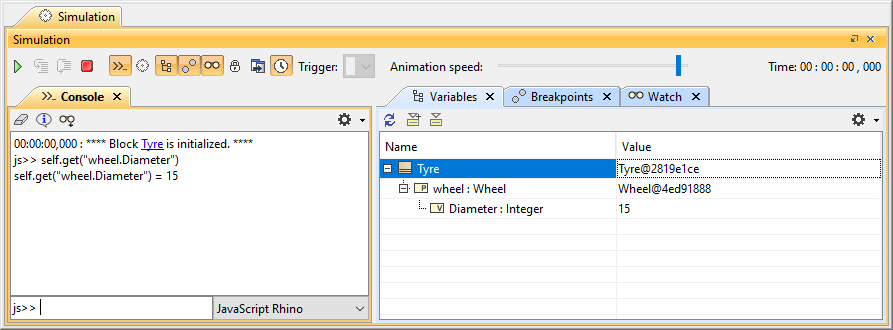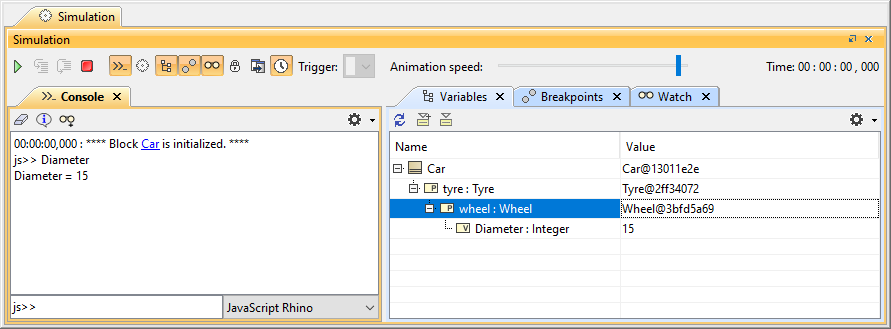In Cameo Simulation Toolkit, you can use the following types of action scripts to manipulate runtime objects:
- fUML object syntax, which simplifies some ALH actions. Example: object.get("property")
ALH (Action Language Helper) scripts. Example: ALH.getValue(object, "property")
- Alf - Action Language for fUML (requires an additional plugin). Example: object.property
Action scripts can be used anywhere where scripts are evaluated during simulation (e.g., Opaque Behaviors, Actions, Guards, or even directly in the simulation Console pane). You can use them to get and specify a Structural Feature value, call a specific behavior or operation, create a runtime object, get its current State, create a Signal instance, and more.
When executing a script, you always need to specify its context (object). Most commonly, it is the current simulation context (marked as "self" in a script). However, it can also be an input pin (pin name) or an object created in a script itself (see Creating a runtime object).
Analyze the example described below to see how scripts change depending on the context.
Example
In the example below, to get the Diameter Value Property when the script is executed in the Car Block, the script should be self.get("tyre.wheel.Diameter").
Getting the Diameter Value Property when the simulation context is the Car Block.
However, if you wanted to get the same Diameter Value Property when executing the script in the Tyre Block, the script should be self.get("wheel.Diameter").
Getting the Diameter Value Property when the simulation context is the Tire Block.
Note that when executing scripts directly in the simulation Console pane, the context is the currently selected element in the Variables pane. So even if the simulation context is the Car Block, selecting the wheel Part Property in the Variables pane allows you to access the Diameter Value Property directly, as shown below.
Getting the Diameter Value Property when the script is executed in the Console pane.
Tip
It is easy to access elements that are deeper in the hierarchy tree, but accessing parent elements is more complicated. Therefore, it is important to plan where executing a particular script would be the most efficient.
To learn more, refer to the following topics:
- Manipulating structural values
- Manipulating global variables
- Calling behaviors and operations
- Creating a runtime object
- Creating and sending signals
- Getting a token value
- Checking States
- Evaluating an expression
- Creating an ArrayList in Java
- Getting simulation context
- Getting simulation time
- Getting the caller of a script
Additional resources
- You can find more examples of API usage at <install_root>\samples\simulation\SmallTestSamples.mdzip (Tests section).
- For more information, see the JavaDoc at <install_root>\openapidocs\SimulationJavaDoc.


